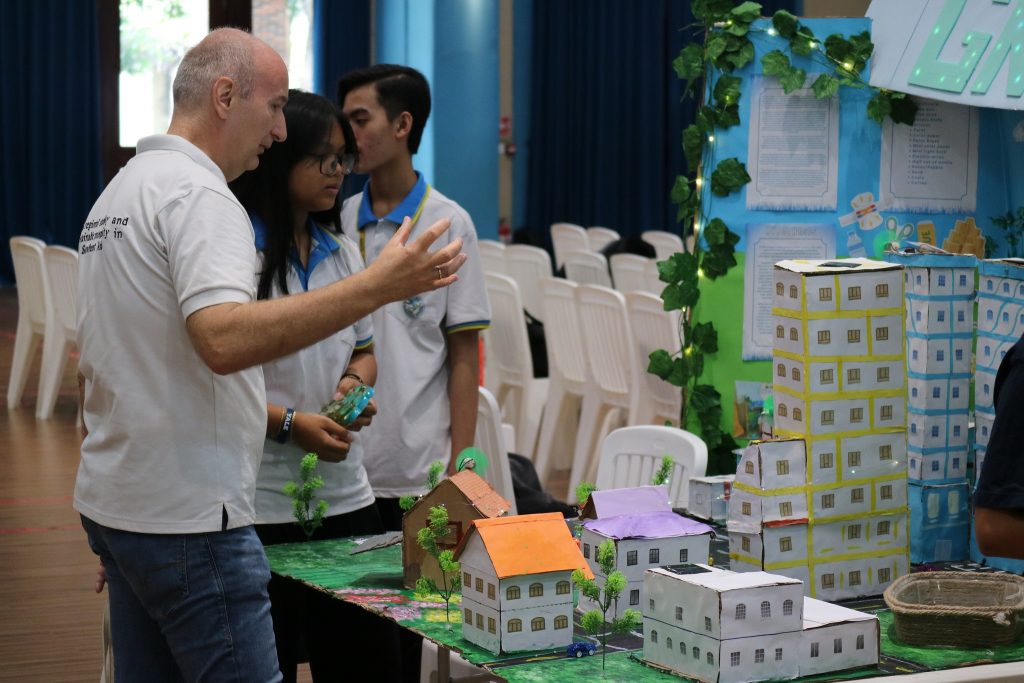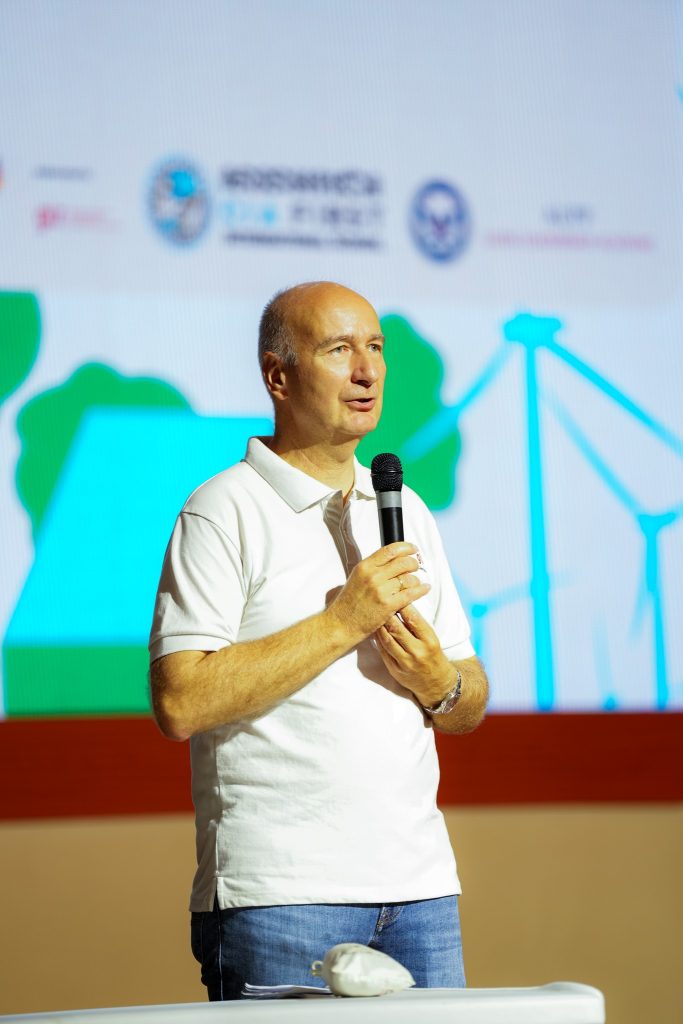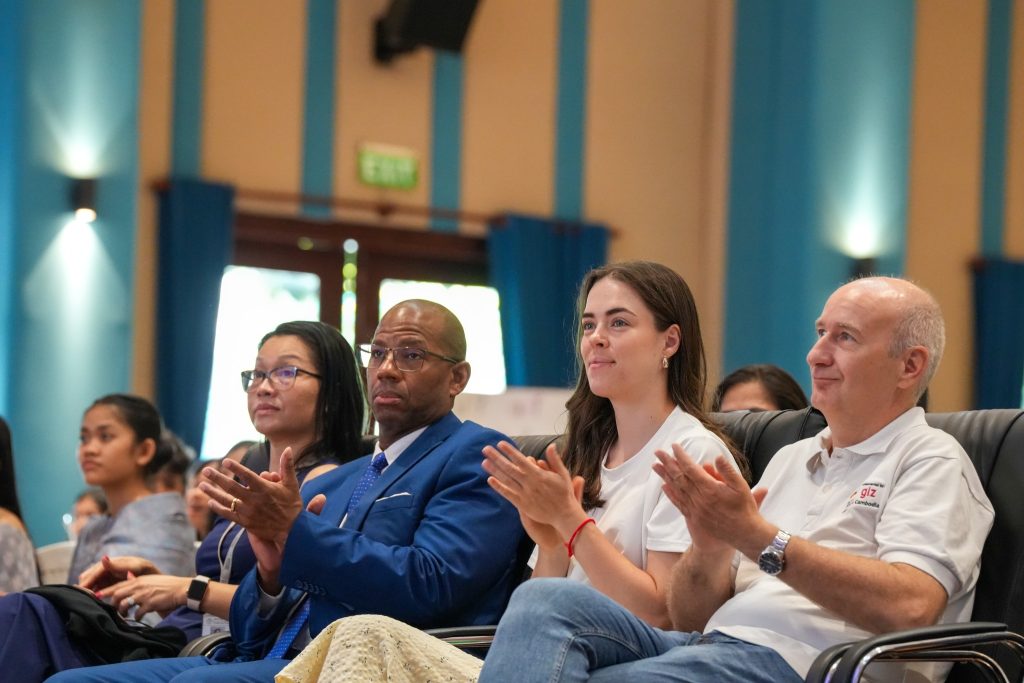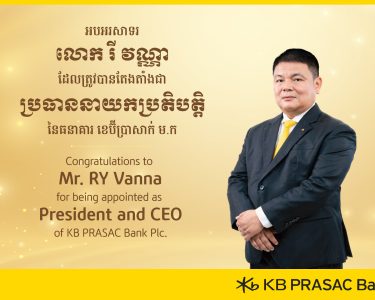Stew Post
Senior Communications Officer Stew Post caught up with Frank Jattke, GIZ Team Leader ASEAN in Cambodia. With GIZ’s Cambodia Circular Economy Forum (CCEF) 2025 wrapping up recently, their discussion explored concepts of circularity in economies and supply chains, what these strategies look like in Cambodia and some of the key challenges and opportunities facing the adoption of circularity in the Kingdom.
Stew: Can you start by giving us a bit of personal and professional background? How did you come to work with GIZ? What’s your role as ASEAN Team Leader?
Frank: I have been working with GIZ since 1996. During this time, I have been part of various project teams in Germany, Russia, Ukraine, Kazakhstan, and Indonesia. Since 2020, I have been leading the ASEAN Team of GIZ in Cambodia. Our team implements projects across diverse fields, including SME promotion, competition, consumer protection, agricultural value chains, environmental protection, sustainable consumption and production, and solid waste management. Despite this thematic diversity, our team actively seeks to identify and leverage synergies both within our projects and with other GIZ initiatives in Cambodia. As Team Leader, my role is to coordinate our work, provide ideas and inspiration, and support my team members.

Cambodia Circular Economy Forum 2025
Stew: GIZ recently organised the Cambodia Circular Economy Forum 2025, with a focus on key sectors driving the nation’s economy. What were the goals of the forum and what does a circular economy look like in Cambodia?
Frank: Yes, the Cambodia Circular Economy Forum (CCEF) 2025 was held from 10 to 12 September and marked a major milestone for our work. In partnership with the Ministry of Environment, we organised this forum to create a platform for exchange among stakeholders from the public sector (at both national and subnational levels), private sector, academia, and civil society. The event aimed to raise public awareness of the importance of transitioning from linear economic models to circular approaches and to highlight the significant potential this transformation holds for Cambodia’s national economy.
The shift from a linear to a circular economy has become necessary due to the unsustainable extraction of finite resources and the increasing environmental damage caused by the traditional “take-make-dispose” model. The circular economy offers a solution by keeping products and materials in use longer, reducing waste and pollution, and operating within the planet’s ecological limits. This transition helps address climate change, resource shortages, and social inequalities linked to pollution.
For national economies, embracing this shift brings multiple benefits. It drives economic growth by creating new business opportunities and jobs in sectors like repair, recycling, and green technology. Companies gain competitiveness by cutting costs through resource efficiency and innovation. Furthermore, it enhances resilience by reducing dependency on scarce raw materials and volatile supply chains. Overall, the circular economy fosters sustainable development, improves environmental health, and supports livelihoods, making it a vital pathway for economic and social progress.
Over the past years, the Royal Government of Cambodia has laid a strong foundation for the circular economy with key policy documents such as the National Circular Economy Strategy and Action Plan, the Circular Strategy on Environment 2023-2028, and the Roadmap for Sustainable Consumption and Production 2022-2035. Under the theme “Roadmap to a Clean, Green and Sustainable Cambodia,” CCEF 2025 provided a valuable space to discuss concrete steps to operationalise these policies.
During the three days of the CCEF, we engaged with more than 250 participants in intensive exchanges and insightful discussions, strengthening our networks across all stakeholder groups. The attendance and inputs from H.E. Dr. Eang Sophaleth, H.E. Cham Nimul, and other high-level representatives from the Ministry of Environment, Ministry of Commerce, Ministry of Agriculture, Forestry and Fisheries, Ministry of Interior, and Ministry of Tourism underscore the strong commitment of the Royal Government to advancing the circular economy transition.
I think, we can proudly say that CCEF 2025 achieved its goal of enhancing understanding among stakeholders about the necessary steps toward a clean, green, and sustainable future for Cambodia.
Stew: GIZ’s work touches on a broad range of topics, from democracy and the rule of law to environmental protection and employment. How does the concept of a circular economy fit into GIZ’s broader work?
Frank: Indeed, GIZ supports our Cambodian partners in diverse fields. However, we do not implement projects in isolation. We actively seek synergies and design integrated solutions wherever possible. I would like to share two concrete examples:
Under the topic of SME promotion, we supported the creation of two important platforms where Small and Medium Enterprises can access vital information and establish business contacts—KhmerSME and ASEAN ACCESS. These platforms have already hosted several exchange events on topics such as “sustainable packaging” and the “green economy” for SMEs in Cambodia and the ASEAN region.
Under two regional projects, we supported improvements in solid waste management in Kratie and Siem Reap by providing technical inputs and facilitating knowledge transfer from other ASEAN member states. Simultaneously, the Improved Service Delivery (ISD) program assists local governments in establishing participatory planning structures and enhancing staff capacities. We quickly recognised the benefits of combining and coordinating our activities. This holistic approach is one of GIZ’s greatest strengths worldwide, helping to create meaningful and lasting impacts.
As you rightly mentioned, GIZ supports Cambodian partners across many fields, many of which are relevant to the circular economy – a complex topic impacting all business sectors and trades. (Circular economy principles even apply at the household level.) Therefore, it was natural for many different GIZ-implemented projects to join forces when organising the Cambodia Circular Economy Forum. Reviewing the agenda, you’ll see topics reflecting activities from projects like EU-German CAPSAFE, ASEAN AgriTrade, ISD, GGI4CE, FABRIC, DTC, ASEAN SME, TraCE, and AMUSE. It would be too detailed to explain all here, but I am glad to share more about our work on request.
I want to emphasise that GIZ is uniquely positioned to support Cambodia’s transition to a circular economy due to its extensive and diverse global experience implementing effective circular economy projects across multiple sectors. Leveraging strong partnerships with governments, businesses, and civil society worldwide, GIZ brings proven expertise in sustainable resource management, waste reduction, and innovative circular business models.

The Role The Private Sector Plays In Circularity
Stew: Along with representatives from the Cambodian government – the forum was organised with the support of the Ministry of Environment – academia, development organisations, and private sector stakeholders were all present at the forum.
What is the importance of bringing businesses into these discussions and what role does the private sector play in circularity?
Frank: Bringing businesses into discussions about the circular economy is crucial because they are key actors in implementing circular practices. The private sector plays a pivotal role in developing and providing circular products and services, innovating production and distribution systems, and creating closed-loop supply chains that maximise resource efficiency. Without active participation from businesses, the circular economy transition would struggle to gain momentum.
The private sector influences circularity by rethinking production processes to minimise waste, extending product lifecycles through reuse and recycling, and adopting sustainable business models that integrate circular principles. Businesses also have the flexibility to innovate and adapt quickly, which can accelerate the adoption of circular practices. Furthermore, private companies contribute to job creation in recycling, repair, and remanufacturing industries while helping reduce environmental impact and carbon emissions.
A multi-stakeholder platform like CCEF is so important because strategic partnerships between businesses, governments, and other stakeholders are essential to foster innovation, overcome barriers, and scale up circular economy models. Moreover, leadership within companies is critical to crafting and implementing sustainability strategies tailored to specific industries, ensuring that circular economy benefits are realised effectively. Overall, the private sector is indispensable for translating circular economy ideas into real economic, social, and environmental value.
There are already some good samples here in Cambodia from different sectors of how enterprises can introduce circularity by using residues of their production – formerly seen as waste – to save costs, innovate their production or increase productivity. By showcasing those samples to a broader public, we were hoping to motivate more enterprises to follow.
Stew: One session during the forum was dedicated to “Advancing Textile Waste Solutions through Policy and Partnership.” Within the Cambodian context, what are the key obstacles to enacting circular waste practices in the GFT sector? What are the strategies to overcome these challenges?
Frank: The garment sector in Cambodia faces multiple challenges that hinder the advancement of circular economy practices. Many key players such as factories, service providers, and local governments still lack a comprehensive understanding of circular economy principles, often focusing on visible waste streams like plastics while neglecting crucial aspects like textile waste management, particularly sorting and collection. The country’s textile recycling infrastructure remains limited, with most facilities primarily engaged in downcycling rather than true recycling. Meanwhile, incineration and landfill disposal continue to dominate, restricting opportunities for effective resource recovery and value creation.
Financial and economic barriers further complicate progress. Small businesses and informal waste handlers encounter significant difficulties due to high costs of investment, regulatory burdens, and taxation policies that do not incentivise circular practices. For example, textile waste sales are taxed, while cheaper disposal options like landfilling remain allowed, discouraging recycling efforts. The garment sector’s complex and fragmented global supply chains add another layer of difficulty, with textile waste often crossing borders through informal channels, making traceability and enforcement of responsible recycling problematic.
To address these issues, GIZ piloted a successful circularity initiative in Cambodia in 2024, engaging factories, international brands, partners, and recyclers to improve waste sorting and connect textile waste with recycling facilities. Building on this achievement, the Circular Fashion Partnership (CFP) is being established in Cambodia in collaboration with the Global Fashion Agenda, following similar efforts in Bangladesh and Indonesia. The partnership aims to scale circularity by strengthening capacity through training local advisory providers, enhancing waste segregation and collection systems in factories, and promoting collaboration among factories, waste handlers, and recyclers.
Advocacy for regulatory reforms is a key strategy, with ongoing dialogue with government agencies such as the Ministry of Environment and the General Department of Customs and Excise to address taxation issues and create incentives for circular business models. The initiative also focuses on fostering business linkages between brands, factories, and recyclers to open markets for recycled textiles. Finally, knowledge sharing and peer learning are prioritised to build sector-wide awareness and accelerate the adoption of circular practices, paving the way for a more sustainable and competitive garment industry in Cambodia. This collective effort is vital for transforming textile waste into a valuable resource, enhancing environmental sustainability, and securing the long-term resilience of Cambodia’s textile sector within global supply chains.

Promoting Circularity In Southeast Asian Economies
Stew: Looking ahead, what steps can be taken to maintain the momentum created during the forum?
What are your team’s next steps for promoting circularity in Southeast Asian economies?
Frank: As mentioned earlier, we are proud of the strong participation and engagement of diverse stakeholders from the public, private, and civil society sectors at the CCEF 2025. Building on this broadened network, GIZ will continue its efforts across all relevant projects to create tangible examples of successful circular economy practices within the Cambodian national economy. Together with our political partners from the Royal Government of Cambodia and implementing partners at the local level, we will continuously support the public-private dialogue to strengthen the legal framework incentivising circular practices.
For example, we will support the Ministry of Environment in engaging the private sector in implementing the recently endorsed regulation on Extended Producer Responsibility (EPR) for e-waste. This regulation mandates manufacturers, importers, and suppliers to establish systems for collecting, transporting, and managing e-waste responsibly, representing a significant step forward for environmental protection in Cambodia.
Another important initiative is the introduction of household-level waste segregation, which we are promoting through our pilot project in Battambang.
No country can succeed in the transition from a linear to a circular economy alone. The ASEAN Economic Community provides an important foundation for developing just and regional circular value chains. Against this background, we will soon begin implementing the new Trade-related Aspects of Circular Economy (TraCE) project. This project will address challenges and opportunities related to cross-border trade in recyclable materials and products made from them, thereby facilitating regional circular economy integration.
Overall, my colleagues and I are strongly committed to further supporting Cambodia’s transition to a clean, green, and sustainable circular economy.





